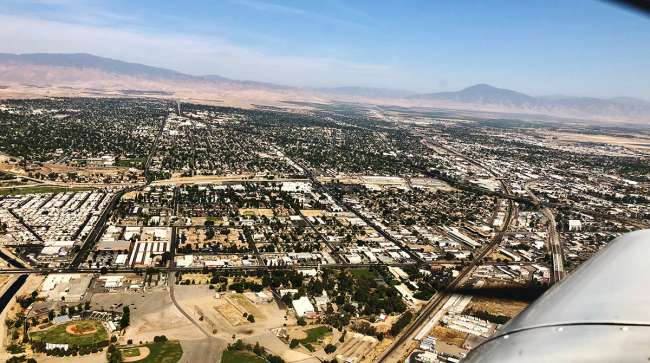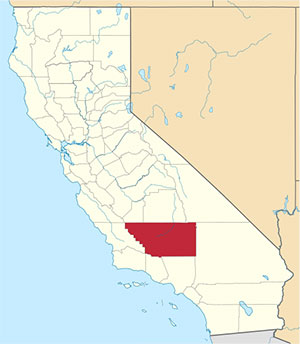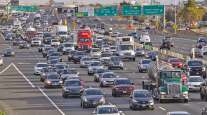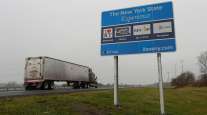Staff Reporter
ASCE Gives California's Kern County C on Infrastructure

Kern County, California’s third largest by surface area, has earned an overall C on an infrastructure report card developed by the region’s American Society of Civil Engineers division.
ASCE’s Southern San Joaquin Branch released a scorecard Sept. 18 that assessed nine elements of Kern County’s infrastructure: aviation, bridges, drinking water, parks, rail, roads, solid waste, transit and wastewater.
ASCE routinely publishes infrastructure report cards for individual states and the country as a whole. ASCE spokesperson Emily Castellanos said that, besides these report cards, the group publishes regional scorecards. These scorecards are volunteer-driven, meaning that ASCE members in that region determine grading categories and tabulate scores. The Kern County report card is one of two regional scorecards ASCE has released this year. The other assessed infrastructure of the Twin Ports area in Minnesota.
Kern County Report Card Committee Chairman Daniel Cronquist said that the county’s first infrastructure report card came out in 2009 and was updated in 2012.

Kern County's location in California. (David Benbennick/WikiCommons)
“The committee wanted to update the report card to account for the large investment in transportation funding and changes in the other infrastructure that have occurred over the last 10 years,” Cronquist told Transport Topics. “We’ve had a lot of positive improvements and some areas of challenges. Every decade or so, it’s good to look at that and get people talking about it again.”
Kern County, located about 133 miles north of Los Angeles, is larger than Connecticut and Delaware combined. Agriculture is an important industry in Kern, the largest crop-producing county in California. Grapes, almonds, citrus, pistachios and milk made up its top five commodities in 2016.
“Infrastructure is the backbone of our daily lives and communities,” the group said in its full report on the scorecard. “While we don’t always acknowledge it, the condition of our infrastructure has a very real impact on every person and business. We all depend on roads and bridges to get us where we are going, water infrastructure that delivers clean water to our taps and a system of roads, rail and transit to move goods and people that fuel our economy.”
Parks and transit scored worst, each earning a D+. The report notes that these categories have suffered budget cuts and faced rising costs. For example, a full-time parks employee would have been responsible for about 9 acres of land a decade ago. Today, that same employee is responsible for upward of 12 acres.
Bridges, with a B+, was the highest-scoring category. According to the report, county government officials have reduced the number of bridges in need of upgrades from 9.1% in 2008 to 2.5% in 2016. However, repairs still are needed. Some 53% of bridges in the region have exceeded their original 50-year life spans.
Kern County’s 6,400-mile network of roads scored a C-. Cronquist said that one of the most successful road projects has been the Thomas Roads Improvement Program to modernize infrastructure around Bakersfield, the county’s largest city. This program includes the expansion of state Route 58, which moves through Bakersfield and connects to Interstate 5.
“We have a heavy freight line there for trucks,” Cronquist said. “Previously, the freeway dead-ended at the city and then caused trucks to have to drive on surface streets or conventional highways through a very urbanized area.”
Kern County by Transport Topics on Scribd
Despite modernizing roads in the Bakersfield area, maintaining rural routes remains a challenge. The rural roads through Kern County link farms to larger routes, which lead to major cities. Cronquist explained that many of the routes used to haul agricultural products — the area’s economic staple — are in remote areas that are scarcely populated by constituents.
“They get hit with very heavy truck traffic trying to get between the various population centers and move agriculture and oil from our area out. As a result, that just pounds the roads quite a bit,” Cronquist said. “There’s a lot of deferred maintenance because we have a lot of roads but not necessarily a lot of people to pay for them.”
The report urges California voters to reject an effort to repeal the Road Repair and Accountability Act, also known as Senate Bill 1, in November. Signed into law in April 2017, SB 1 is projected to create $54 billion over the next decade to fix roads, freeways and bridges.
Proposition 6, which will appear on the California ballot Nov. 6, would repeal the increase in the fuel tax that was enacted as part of SB 1. The proposition also would require a majority of voters to support any future fuel tax increase.
“Do not repeal SB 1, which is an essential source of funding for local agencies,” the report states. “SB 1 is the first new significant source of statewide transit funding in decades.”




